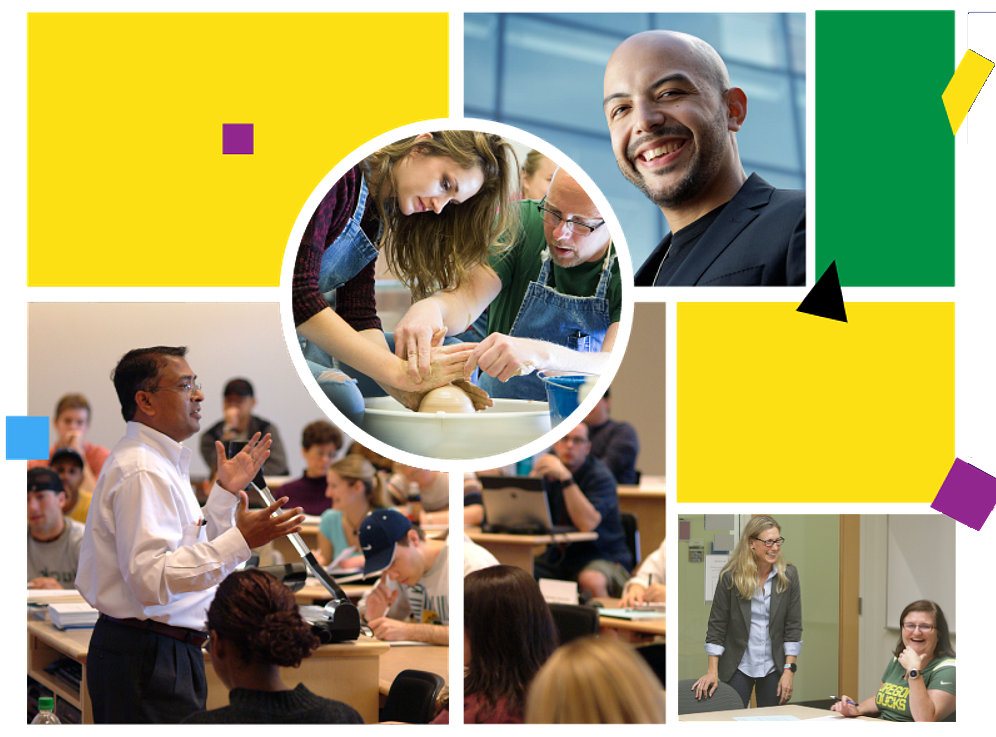
As a recipient of a grant to resource inclusive and effective teaching initiatives on campus, UO looks forward to an increased capacity to support inclusive and excellent teaching.

Inclusive Teaching at UO
UO defines inclusive teaching as instruction designed to ensure every student can participate fully and that their presence and participation is valued. UO’s definition also describes an inclusively taught course as one in which "course content would reflect the diversity of the field's practitioners, the contested and evolving status of knowledge, the value of academic questions beyond the academy and of lived experience as evidence, and/or other efforts to help students see themselves in the work of the course."
Each academic unit is making this definition their own in terms of policy, and UO instructors are bringing inclusive teaching to life through practices in their own classes across disciplines.
Projects, Events, & Initiatives
Current & Ongoing Projects
Implementation Grants
In the 2024-2025 academic year, units submitted proposals for funding to support activities like implementation of a new peer review of teaching committee, activities related to inclusive teaching and course development, or a department retreat focused on teaching values and principles. Projects like these advance collective, culture-change efforts related to inclusive and effective teaching in practice and policy. Over $35,000 has been awarded to departments across campus. Applications are currently closed and we look forward to sharing progress on these projects next year.
Glass Apple Podcast
Join hosts Troy Elias, Associate Vice Provost for Diversity and Inclusion, and Lee Rumbarger, Associate Vice Provost for Teaching Engagement, as they interview guests who offer us a rare look inside their classrooms and ways of thinking about teaching. Our focus: we want to know how our guests develop and run classes where students feel they belong and can thrive—in the room, in the discipline. Episodes include interview with Kirby Brown (English, Native American Studies), Danny Pimentel (SOJC), Leah Schneider (Marketing), and Camisha Russell (Philosophy). More episodes coming Spring term 2024.
Students as Pedagogical Partners
Students are paired with faculty to give feedback on inclusive and effective teaching. The pilot program will run during the 2024-2025 academic year. Participants will learn how UO defines good teaching, how to observe classes, and how to give concrete, caring, and actionable feedback.
Teaching Triangles
Teaching Triangles are groups of three faculty members from the same unit who observe one another’s teaching and meet to share formative feedback. Separate from the peer review process associated with teaching evaluation for merit, promotion, and tenure, Teaching Triangles are meant to be collegial opportunities to foster relationships, get a sense of how fellow faculty approach and teach their courses, and develop ideas for improving teaching. Ideally, participants will continue to see each other as friendly colleagues with whom to talk about teaching even after the formal, stipended program concludes.
Department Teaching Policy Leads
Teaching policy leads are stipended colleagues identified by unit heads to facilitate teaching and teaching policy conversation and culture change within their units. Supported with resources and training, they will effectively facilitate departmental conversations on teaching and policy. Teaching Policy Leads help units make the most of the policy update process to elevate teaching and match departments' teaching aspirations.
Past Projects & Activities
Duck In
Duck In, a week of informal, collegial class observations across the curriculum took place May 15-18, 2023. Let’s break down some of the solitude around teaching and learn from one another in action! Faculty identified an inclusive teaching practice they’re working toward and opened seats in their courses—colleagues claimed those seats, getting a student’s eye view of the class and a special window into how a colleague approaches a shared teaching goal.
Teaching Excellence & Evaluation CAIT
The Teaching Excellence and Evaluation CAIT supported units in making UO’s professional, inclusive, engaged, and research-informed teaching quality standards meaningful in their real teaching contexts. Participating units undertook a process to update peer review tools and overall teaching evaluation criteria in alignment with new university policy and with the practices and aspirations specific to their unit colleagues. Documents created are showcased on the Teaching Support and Innovation website as models for other units. Learn more about the CAIT.
Resources
